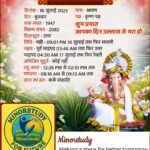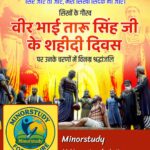🌟 7 Unforgettable Contributions of Bhisham Sahni That Positively Changed Indian Literature
Bhisham Sahni: India has produced countless literary giants whose words echo through generations, but few have shaped the emotional and historical consciousness of the nation like Bhisham Sahni. A towering figure in Hindi literature, Sahni’s work is a bridge between intellectual realism and human emotion, offering deeply reflective insights into partition, society, politics, and human relationships.
From his iconic novel Tamas to his poignant short stories and plays, Bhisham Sahni’s legacy continues to inspire writers, thinkers, and common readers alike. Let’s delve deep into his life, works, influence, and timeless relevance.
📜 History and Life of Bhisham Sahni
Full Name: Bhisham Sahni
Born: 8 August 1915, Rawalpindi, British India (now in Pakistan)
Died: 11 July 2003, New Delhi, India
Languages Known: Hindi, Urdu, Punjabi, English
Profession: Writer, playwright, translator, teacher, freedom fighter
Bhisham Sahni was more than a writer — he was a voice of the masses, a mirror to society, and a truth-teller of India’s troubled past. He was raised in a progressive, educated family, the younger brother of actor Balraj Sahni, and grew up during a period of nationalistic fervor and sociopolitical upheaval.
🕰️ Timeline of Key Events in Bhisham Sahni’s Life
| Year | Event |
|---|---|
| 1915 | Born in Rawalpindi |
| 1943 | Earned a Master’s degree in English Literature |
| 1947 | Witnessed Partition violence; deeply impacted |
| 1957–63 | Lived in Moscow; translated Russian literature |
| 1974 | Wrote Tamas, a monumental novel on Partition |
| 1975 | Received Sahitya Akademi Award for Tamas |
| 1998 | Conferred the Padma Bhushan |
| 2003 | Passed away in New Delhi at the age of 87 |
📘 7 Unforgettable Contributions of Bhisham Sahni
1. 🕯️ Tamas – A Literary Landmark on Partition
Bhisham Sahni’s most famous work, Tamas (1974), is a heart-wrenching account of the Partition of India. Through chilling realism and nuanced character portrayal, the novel exposes the absurdity of communal hatred and the fragility of human lives during mass violence.
➡️ Adapted into a nationally acclaimed TV series by Govind Nihalani in the late 1980s.
2. 🎭 Enriching Hindi Theatre with Plays
Sahni’s dramatic works such as:
Hanoosh (1981)
Kabira Khada Bazaar Mein
Madhavi
…brought history and mythology into the modern social context, giving voice to philosophical questions and moral dilemmas through engaging theatrical narratives.
3. 📚 Pioneer of Realist Short Stories
His short stories such as:
Chief ki Daawat
Pali
Amritsar Aa Gaya
…are classics in Hindi literature, known for their emotional depth and honest portrayal of urban and rural India, dealing with class conflict, migration, and loneliness.
4. 🌍 Promotion of Cross-Cultural Literature
During his time in the Soviet Union, he translated Tolstoy, Chekhov, and other Russian literary masterpieces into Hindi, helping Indian readers connect with global literature.
5. 🖋️ Service to Hindi Sahitya (Hindi Literature)
Served as General Secretary of the All India Progressive Writers’ Association
Associated with IPTA (Indian People’s Theatre Association)
Advocated for literature with social responsibility
6. 🕊️ A Writer and Freedom Fighter
Bhisham Sahni was actively involved in the Indian freedom movement, working with relief efforts during the Partition riots. His personal experiences made his stories real and relatable, connecting with common people’s trauma and aspirations.
7. 🏅 Honors and Awards
| Award | Year | For |
|---|---|---|
| Padma Bhushan | 1998 | Lifetime Contribution to Literature |
| Sahitya Akademi Award | 1975 | Tamas |
| Shalaka Samman | 1992 | Hindi Academy, Delhi |
| Lotus Award | 1981 | Afro-Asian Writers’ Association |
🌟 Significance of Bhisham Sahni in Indian Society
Bhisham Sahni was not just a literary genius; he was a moral compass for India. His writings encouraged people to:
Think beyond communal divisions
See the plight of refugees and minorities
Reflect on power structures and politics
Value compassion and coexistence
He humanized the historical and political narratives that textbooks couldn’t.
🎉 Observance and Remembering Bhisham Sahni
Each year on his birth anniversary (August 8) and death anniversary (July 11), universities, theatre groups, and literary forums across India:
Host Tamas readings and stage plays
Organize writing workshops and memorial lectures
Publish articles and journals on his literary significance
His centenary in 2015 was widely celebrated with discussions, retrospectives, and performances.
💡 Important Points to Remember
✅ Tamas is not just a novel—it is a social document
✅ He emphasized humanism over politics
✅ His work bridges traditional and modern India
✅ Wrote in simple yet powerful Hindi, making literature accessible
✅ Lifelong advocate for progressive thought and secularism
🤔 Frequently Asked Questions (FAQs)
Q1. What is Bhisham Sahni’s most famous book?
Tamas (1974), based on the Partition, remains his most powerful and impactful work.
Q2. Was Bhisham Sahni only a novelist?
No, he was also a playwright, short story writer, translator, and freedom activist.
Q3. What themes did he often explore?
Partition trauma, class struggle, communalism, human dignity, power, and morality.
Q4. How is he different from other Partition writers?
Sahni provided grassroots realism—the view from inside common homes and hearts, not just political commentary.
Q5. Where can I read his work?
His books are available in Hindi, English translations, and dramatized forms through TV, stage, and online platforms.
💬 Heartfelt Wishing to Honor His Memory
“May we always find courage to tell the truth like Bhisham Sahni did—with honesty, empathy, and fearless storytelling.”
“On this day, let us revisit Tamas, not just as a book, but as a reminder of why humanity must never bow to hatred.”
🌍 Importance in Our Life & Society Today
In an age filled with polarization and disinformation, Bhisham Sahni’s work stands as a beacon of truth and conscience.
His literature:
Sparks empathy in a divided society
Reminds youth of history’s human cost
Encourages writers to be bold and socially responsible
Promotes critical thinking and moral accountability
“His pen was not a weapon of war, but a tool for healing wounds invisible to the eye but deep in the soul.”
🧠 Conclusion: A Timeless Human Voice
Bhisham Sahni legacy is a testament to literature’s power to heal, inform, and transform. He didn’t just write stories — he preserved emotions, struggles, and truths that shape the Indian psyche even today.
To read Bhisham Sahni is to:
Witness truth without bias
Embrace real human stories
And carry forward a legacy of literary courage
Let’s celebrate not only the man, but the human spirit he embodied — humble, bold, compassionate, and unforgettable.








